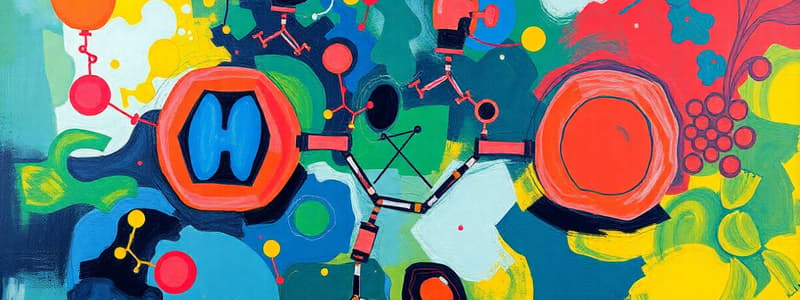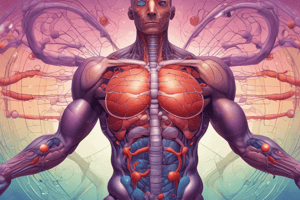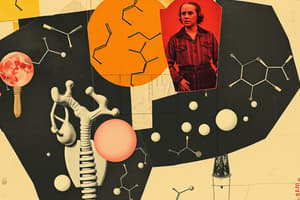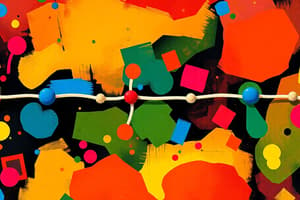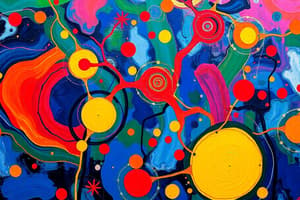Podcast
Questions and Answers
What is created when the signal sequence is removed from the preprohormone?
What is created when the signal sequence is removed from the preprohormone?
- A messenger RNA
- A peptide chain
- An inactive prohormone (correct)
- An active prohormone
Where does the preprohormone get directed after undergoing translation by ribosomes?
Where does the preprohormone get directed after undergoing translation by ribosomes?
- Golgi complex
- Nucleus
- Cytoplasm
- Endoplasmic reticulum (ER) (correct)
What is the function of the enzymes in the endoplasmic reticulum (ER) during prohormone processing?
What is the function of the enzymes in the endoplasmic reticulum (ER) during prohormone processing?
- To chop off the signal sequence (correct)
- To synthesize preprohormones
- To create active hormones from prohormones
- To package hormones into vesicles
Which hormone is primarily responsible for regulating circadian rhythms?
Which hormone is primarily responsible for regulating circadian rhythms?
What is the role of ribosomes in the synthesis of hormones?
What is the role of ribosomes in the synthesis of hormones?
What structure is responsible for packaging the prohormone after it has exited the ER?
What structure is responsible for packaging the prohormone after it has exited the ER?
Which gland is responsible for the secretion of catecholamines?
Which gland is responsible for the secretion of catecholamines?
What is the primary target of vasopressin (ADH)?
What is the primary target of vasopressin (ADH)?
What is the state of the prohormone after it leaves the endoplasmic reticulum but before it reaches the Golgi complex?
What is the state of the prohormone after it leaves the endoplasmic reticulum but before it reaches the Golgi complex?
Which of the following hormones does not stimulate growth in tissues?
Which of the following hormones does not stimulate growth in tissues?
In which cellular component does the initial translation of the hormone occur?
In which cellular component does the initial translation of the hormone occur?
What is the first step in the synthesis of a prohormone?
What is the first step in the synthesis of a prohormone?
Which hormone is secreted by the anterior pituitary gland to initiate milk production?
Which hormone is secreted by the anterior pituitary gland to initiate milk production?
After enzymes process the prohormone, what pathway does it generally take?
After enzymes process the prohormone, what pathway does it generally take?
Which of the following hormones is derived from tryptophan?
Which of the following hormones is derived from tryptophan?
What is the initial structure formed before a prohormone is processed into active peptides?
What is the initial structure formed before a prohormone is processed into active peptides?
During the processing of a prohormone, which organelle is responsible for bud formation of secretory vesicles?
During the processing of a prohormone, which organelle is responsible for bud formation of secretory vesicles?
What signal triggers the release of contents from a secretory vesicle?
What signal triggers the release of contents from a secretory vesicle?
After the prohormone passes through the Golgi complex, what occurs next?
After the prohormone passes through the Golgi complex, what occurs next?
What happens to the peptide fragments generated during prohormone processing?
What happens to the peptide fragments generated during prohormone processing?
What role does mRNA play in the synthesis of a preprohormone?
What role does mRNA play in the synthesis of a preprohormone?
Where do the contents of secretory vesicles go after exocytosis?
Where do the contents of secretory vesicles go after exocytosis?
What are the end products of prohormone processing in the Golgi complex?
What are the end products of prohormone processing in the Golgi complex?
What does the term 'exocytosis' refer to in the context of secretory vesicles?
What does the term 'exocytosis' refer to in the context of secretory vesicles?
Which of the following is NOT involved in the synthesis of a preprohormone?
Which of the following is NOT involved in the synthesis of a preprohormone?
What role does the signal sequence play during the transport of proteins into the endoplasmic reticulum?
What role does the signal sequence play during the transport of proteins into the endoplasmic reticulum?
What occurs to the signal sequence once the prohormone is in the endoplasmic reticulum?
What occurs to the signal sequence once the prohormone is in the endoplasmic reticulum?
After the prohormone leaves the endoplasmic reticulum, where does it pass through next?
After the prohormone leaves the endoplasmic reticulum, where does it pass through next?
What happens to the prohormone during its processing in the Golgi complex?
What happens to the prohormone during its processing in the Golgi complex?
What mechanism is used by the secretory vesicle to release its contents into the extracellular space?
What mechanism is used by the secretory vesicle to release its contents into the extracellular space?
After the Golgi complex processes the prohormone, what are the components that are typically produced?
After the Golgi complex processes the prohormone, what are the components that are typically produced?
Which part of the cell is primarily responsible for processing and packaging the prohormone?
Which part of the cell is primarily responsible for processing and packaging the prohormone?
What is the immediate fate of the prohormone upon entering the endoplasmic reticulum?
What is the immediate fate of the prohormone upon entering the endoplasmic reticulum?
What type of molecule serves as a precursor that is cleaved into active hormones in the Golgi complex?
What type of molecule serves as a precursor that is cleaved into active hormones in the Golgi complex?
What is released into the extracellular fluid (ECF) as the final product of this processing pathway?
What is released into the extracellular fluid (ECF) as the final product of this processing pathway?
What distinguishes steroid hormones from peptide hormones in terms of their synthesis?
What distinguishes steroid hormones from peptide hormones in terms of their synthesis?
Where are steroid hormone receptors primarily located?
Where are steroid hormone receptors primarily located?
What role do carrier proteins play for steroid hormones in the bloodstream?
What role do carrier proteins play for steroid hormones in the bloodstream?
Which statement about the action of steroid hormones is true?
Which statement about the action of steroid hormones is true?
What is a characteristic feature of steroid hormones in terms of their transportation in the blood?
What is a characteristic feature of steroid hormones in terms of their transportation in the blood?
What is the result of binding a steroid hormone to a nongenomic membrane receptor?
What is the result of binding a steroid hormone to a nongenomic membrane receptor?
In what way do steroid hormones differ from most peptide hormones regarding their cellular effects?
In what way do steroid hormones differ from most peptide hormones regarding their cellular effects?
How do peptide hormones generally travel in the bloodstream?
How do peptide hormones generally travel in the bloodstream?
What happens when steroid hormones bind to cytoplasmic receptors?
What happens when steroid hormones bind to cytoplasmic receptors?
Which statement accurately describes the half-life of steroid hormones compared to peptide hormones?
Which statement accurately describes the half-life of steroid hormones compared to peptide hormones?
Flashcards are hidden until you start studying
Study Notes
Hormone Synthesis
- mRNA on ribosomes binds amino acids into a peptide chain called a preprohormone.
- The chain is directed into the ER lumen by a signal sequence of amino acids.
- Enzymes in the ER chop off the signal sequence, creating an inactive prohormone.
- The prohormone passes from the ER through the Golgi complex.
- Secretory vesicles containing enzymes and prohormone bud off the Golgi.
- The enzymes chop the prohormone into one or more active peptides plus additional peptide fragments.
- The secretory vesicle releases its contents by exocytosis into the extracellular space.
Steroid Hormones
- Steroid hormones are made only in a few organs: adrenal glands and gonads.
- Steroid hormones bind carrier proteins in blood, which gives them a longer half-life
- Steroid hormones can bind to cytoplasmic or nuclear receptors, leading to genomic effects that activate or repress genes, which is slower acting.
- Steroid hormones can also bind to cell membrane receptors for rapid nongenomic responses.
Hormone Groups
- Amino Acid-Derived: derived from one of two amino acids, tryptophan and tyrosine.
- Examples: melatonin, catecholamines (epinephrine, dopamine), and thyroid hormones.
- Steroid: Cholesterol-derived
- Made only in a few organs: adrenal glands and gonads.
- Lipophilic, they easily cross membranes.
- Made as needed, not stored.
- Bind carrier proteins in blood.
- Longer half-life.
- Cytoplasmic or nuclear receptors.
- Slower acting.
- Cell membrane receptors.
- Nongenomic responses.
- Peptide: Composed of amino acid chains.
- Most hormones are peptides, including those from the anterior pituitary.
Neurohormones
- Adrenal medulla: Catecholamines (epinephrine, norepinephrine).
- Hypothalamus: TRH, CRH, GHRH, GnRH, dopamine (PIH), somatostatin
Neurohormones
- The pituitary gland is two glands fused as one.
- The posterior pituitary is neural tissue and secretes two neurohormones: vasopressin (antidiuretic hormone or ADH) and oxytocin.
Major Hormone Groups
- Pineal Gland: Melatonin: Main effect on circadian rhythms, immune function, and antioxidant actions; Targets - brain and other tissues.
- Hypothalamus (Neurohormones): Trophic Hormones: Regulate other glands; Targets - Anterior pituitary.
- Posterior Pituitary (Neurohormones): Oxytocin: Targets - breast and uterus. Main effect on milk ejection, labor and delivery, and behavior.
- Vasopressin (ADH):* Targets - kidney. Main effect on water reabsorption.
- Anterior Pituitary (Glandular Hormones):
- Prolactin:* Targets - breast and liver. Main effect on milk production.
- Growth Hormone (somatotropin):* Targets - many tissues. Main effect on growth factor secretion, growth, and metabolism.
- Corticotropin (ACTH):* Targets - adrenal cortex. Main effect on cortisol release.
- Thyrotropin (TSH):* Targets - thyroid gland. Main effect on thyroid hormone synthesis
- Follicle-stimulating hormone (FSH):* Targets - gonads. Main effect on egg or sperm production; sex hormone production.
- Luteinizing hormone (LH):* Targets - gonads. Main effect on sex hormone production; egg or sperm production.
Hormone Groups - Abbreviation Key
- G: Gland
- C: Endocrine Cells
- N: Neuron
- P: Peptide
- S: Steroid
- A: Amino Acid-Derived
Studying That Suits You
Use AI to generate personalized quizzes and flashcards to suit your learning preferences.
